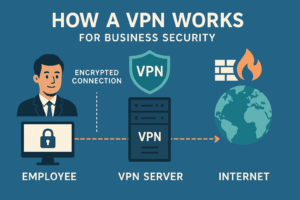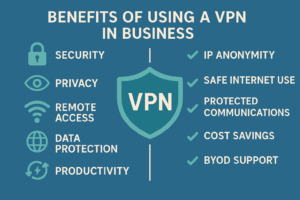Unlocking the Power of VPNs: A Business Owner’s Guide
- Phone: +1(833)PHX-Geek
- 712 H St NE Suite 1904 Washington, D.C. 20002
Are you looking to come to Toast POS? Follow this link to sign up and get a free quote from your local Toast Rep. They will come out to your restaurant, and give you a free, no obligation quote.
Introduction
In the digital age, understanding how to protect your business's online presence is essential. A Virtual Private Network (VPN) is a crucial tool that helps safeguard sensitive data by creating a secure connection over the internet. This article will delve into what VPNs are and why they are vital for business owners.
A VPN functions by encrypting your internet connection, making it difficult for cybercriminals to access your data. By routing your internet traffic through a secure server, a VPN masks your IP address, enhancing your online anonymity. For businesses, this means protecting sensitive information from hackers and ensuring that confidential communications remain private.
Moreover, VPNs are essential for remote work environments. As more businesses adopt flexible work policies, employees require a secure way to access company networks from various locations. A VPN enables this secure connection, making it a must-have for modern businesses aiming to protect their digital assets.
Implementing a VPN can provide numerous advantages for business operations. One of the primary benefits is enhanced security. With robust encryption protocols in place, a VPN ensures that data transmitted between remote employees and the company’s servers remains secure from eavesdropping and interception.
Additionally, VPNs can improve network performance. By reducing latency and bypassing bandwidth throttling, businesses can enjoy faster internet speeds. This performance boost is especially beneficial during peak hours when many users access the internet simultaneously.
 Another significant advantage is the ability to access geo-restricted content. For global businesses, this means being able to connect to servers in different countries, allowing for unrestricted access to essential tools and resources crucial for smooth operations.
Another significant advantage is the ability to access geo-restricted content. For global businesses, this means being able to connect to servers in different countries, allowing for unrestricted access to essential tools and resources crucial for smooth operations.
Integrating a VPN into your business strategy requires careful planning. The first step is to assess your specific needs, including the number of users, types of devices, and data sensitivity levels. This assessment will help you choose the right VPN provider that aligns with your business requirements.
Once you’ve selected a VPN service, the next step is to configure it properly. Maintain clear communication with your team about how to use the VPN effectively. Training employees on security best practices, such as connecting to the VPN before accessing sensitive data, is crucial.
Finally, regularly review and update your VPN usage policies. As your business evolves, so will your security needs. Stay ahead of potential threats by ensuring your VPN solution adapts to changing circumstances and continuously safeguards your digital environment.
Conclusion
In an era where cyber threats are increasingly sophisticated, implementing a VPN can significantly enhance your business's security and privacy. By encrypting data and providing a secure connection for remote access, VPNs serve as a vital component of a comprehensive cybersecurity strategy.
In addition to protecting sensitive information, VPNs also foster trust among clients and partners, showcasing a commitment to data security. As businesses navigate the complexities of the digital landscape, utilizing a VPN can provide peace of mind and a competitive edge.
Ultimately, understanding the benefits of a VPN and effectively integrating it into your operations can lead to increased productivity, enhanced security, and greater peace of mind for business owners.